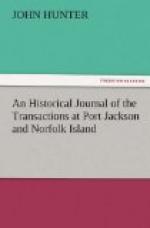Our party set off, in order to get back to sleep near the head of the creek, which they had crossed at noon, and which they soon attained: it was flood-tide when they got there, and they found the tide to rise about eighteen inches, making high water at nine o’clock: this was on the night of the 13th. After crossing the creek at half past seven o’clock the next morning, they shaped a course that was likely to carry them to the river, without being embarrassed with the bad walking on its banks, or the windings of the creek, until they got near the spot, from whence they proposed taking a fresh departure.
After crossing the creek, and some very rocky ground, they had good walking over a country, full of timber and pleasing to the eye; but the ground was poor, and the surface mostly covered with stones. Here some ants nests were seen, composed of an amazing number of small stones, which formed a circle of five or six feet diameter, rising regularly in the center to the height of twenty or thirty inches. An hour and a half s walking brought them to a swamp, where they stopped to fire at some ducks, and then crossing it, they continued their course nearly west 8 deg. north till eleven o’clock, when they came to a pool of good water. The country was now sandy, and presently afterwards, they arrived on the borders of the river, and soon got to the place where they first stopped in the morning of the 12th.
Several canoes being seen, our two natives were very desirous of speaking to the persons in them, and the party were all desired to hide themselves in the grass until the canoes should come abreast of them; Colebe and Ballederry also concealed themselves, but the canoes stopping on the opposite shore before they came near, one of our natives was told to call to them, which he did, and was soon answered by an old man, who, after a short conversation, came over in his canoe, being known to Colebe.
This man joined the party without the least fear; and from the questions that were put to him respecting the river, Colebe and Ballederry concluded they had come this journey in order to procure stone hatchets, as the natives get the stones whereof they make their hatchets from that part of the river near Richmond-Hill, which the old man said was a great way off, and the road to it was very bad.
Colebe and Ballederry had at first supposed, that Governor Phillip and his party came from the settlement to kill ducks and patagorongs; but finding they did not stop at the places where those animals were seen in any numbers, they were at a loss to know why the journey was taken; and though they had hitherto behaved exceedingly well, yet, as they now began to be tired of a journey, which yielded them no sort of advantage, they endeavoured to persuade the governor to return, saying, it was a great way to the place where the stone hatchets were to be procured, and that they must come in a boat.




